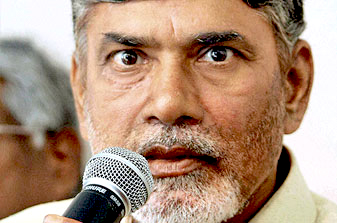Hyderabad, Jun 8: A purported telephonic conversation in an audio tape between Andhra Pradesh chief minister Chandrababu Naidu and nominated MLA Elvys Stephenson, aired in some TV channels, has given a new twist to a cash-for-votes controversy.
The reported conversation suggested that the Andhra CM was giving "assurance of all sorts" to the MLA if he voted for a TDP nominee in the Telangana legislative council election.

TDP legislator Revanth Reddy was arrested on May 31 for allegedly trying to bribe nominated MLA Stephenson to vote for a party nominee in the legislative council election. The anti-corruption bureau of Telangana is in the process of questioning the TDP MLA and two others who have been arrested in cash-for-votes case.
Based on a complaint by Stephenson, Telangana Anti-Corruption Bureau (ACB) officials held Revanth, Sebastian Harry and Uday Simha after they were caught while allegedly handing over Rs 50 lakh to Stephenson. Earlier, Telangana home minister had alleged that Naidu was the key person in the issue.
Reacting to the fresh twist, Parakala Prabhakar, advisor (communications) to the Andhra government said the tapes were fabricated and the AP government was taking the issue seriously.
Prabhakar alleged the Telangana government was trying to malign the image of the Naidu and mislead the people of Andhra Pradesh by resorting to cheap tactics.
He wanted to know from the TRS government as to how it got the audio tape. "If you have done telephone tapping, it is a crime and if you have recorded Mr Chandrababu Naidu's voice on different occasions, tampered it and presented to mislead people that it is his conversation," he said.
"It is not the chief minister's conversation. How come they are available outside. Telangana government has to give answer to this. Telangana CM and home minister should give answers," Parakala said.
Andhra Pradesh's finance minister and senior TDP leader, Y Ramakrishnudu, said the audio tape was a proof that the TRS government was violating law by tapping phones.
The new controversy may create a constitutional crisis as the Telangana ACB is planning to summon Naidu for questioning in the case.
Hyderabad is the common capital of Telangana and Andhra Pradesh. The Telangana Rashtra Samithi (TRS) governmet in Telangana and the Telugu Desam Party (TDP) government in Andhra have taken up the issue with ESL Narasimhan, who is the governor for both the Telugu states.
The audio tape was released just three days after Telangana home minister N Narasimha Reddy said the government had proof that Naidu spoke to Stephenson and some other MLAs of the TRS to lure them to vote for TDP-BJP candidates in the elections.
The audio tape was first played by T News, a Telugu news channel owned by ruling the TRS, and was later picked up by others.
In swift developments on Sunday night, Telangana chief minister K Chandrasekhar Rao met governor Narasimhan at Raj Bhavan, while Naidu called a meeting with Andhra Pradesh director general of police JV Ramudu and other officials to take stock of the situation.
Rao's meeting with the governor, the second in three days, came minutes after the release of the audio tape that came to light a few hours after ACB questioned Reddy and two others for a second day in the cash-for-votes case. A court had sent them to four-day custody of ACB.





Comments
Add new comment